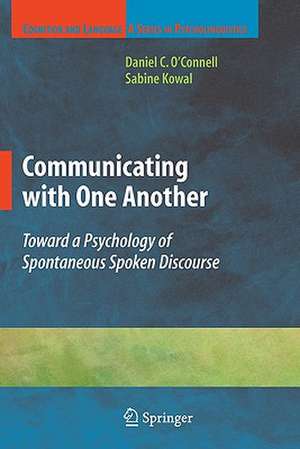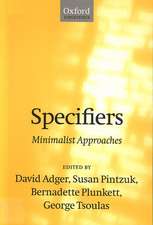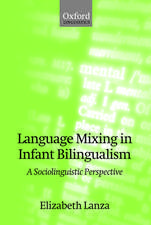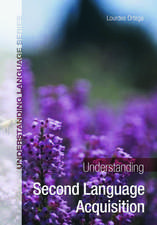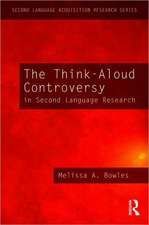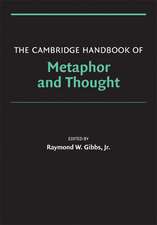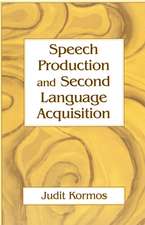Communicating with One Another: Toward a Psychology of Spontaneous Spoken Discourse: Cognition and Language: A Series in Psycholinguistics
Autor Sabine Kowalen Limba Engleză Paperback – 6 dec 2010
The paradigm shift proposed in Communicating with One Another will interest and provoke readers concerned about communicative language use – including psycholinguists, sociolinguists, and anthropological linguists.
| Toate formatele și edițiile | Preț | Express |
|---|---|---|
| Paperback (1) | 640.06 lei 6-8 săpt. | |
| Springer – 6 dec 2010 | 640.06 lei 6-8 săpt. | |
| Hardback (1) | 644.18 lei 6-8 săpt. | |
| Springer – 8 sep 2008 | 644.18 lei 6-8 săpt. |
Din seria Cognition and Language: A Series in Psycholinguistics
- 15%
 Preț: 641.20 lei
Preț: 641.20 lei - 15%
 Preț: 639.08 lei
Preț: 639.08 lei - 18%
 Preț: 955.25 lei
Preț: 955.25 lei - 18%
 Preț: 946.87 lei
Preț: 946.87 lei - 18%
 Preț: 1384.88 lei
Preț: 1384.88 lei - 15%
 Preț: 646.11 lei
Preț: 646.11 lei - 5%
 Preț: 713.33 lei
Preț: 713.33 lei - 18%
 Preț: 1551.25 lei
Preț: 1551.25 lei - 15%
 Preț: 648.42 lei
Preț: 648.42 lei - 15%
 Preț: 648.74 lei
Preț: 648.74 lei - 18%
 Preț: 954.77 lei
Preț: 954.77 lei - 15%
 Preț: 646.43 lei
Preț: 646.43 lei - 18%
 Preț: 1560.11 lei
Preț: 1560.11 lei - 15%
 Preț: 644.49 lei
Preț: 644.49 lei - 18%
 Preț: 952.89 lei
Preț: 952.89 lei - 18%
 Preț: 953.03 lei
Preț: 953.03 lei - 15%
 Preț: 640.24 lei
Preț: 640.24 lei - 15%
 Preț: 638.11 lei
Preț: 638.11 lei -
 Preț: 381.81 lei
Preț: 381.81 lei -
 Preț: 382.75 lei
Preț: 382.75 lei -
 Preț: 385.08 lei
Preț: 385.08 lei - 18%
 Preț: 1716.18 lei
Preț: 1716.18 lei -
 Preț: 383.50 lei
Preț: 383.50 lei -
 Preț: 388.34 lei
Preț: 388.34 lei - 5%
 Preț: 372.38 lei
Preț: 372.38 lei
Preț: 640.06 lei
Preț vechi: 753.01 lei
-15% Nou
Puncte Express: 960
Preț estimativ în valută:
122.48€ • 128.14$ • 101.74£
122.48€ • 128.14$ • 101.74£
Carte tipărită la comandă
Livrare economică 02-16 aprilie
Preluare comenzi: 021 569.72.76
Specificații
ISBN-13: 9781441926609
ISBN-10: 1441926607
Pagini: 288
Ilustrații: XXII, 265 p.
Dimensiuni: 155 x 235 x 15 mm
Greutate: 0.41 kg
Ediția:2008
Editura: Springer
Colecția Springer
Seria Cognition and Language: A Series in Psycholinguistics
Locul publicării:New York, NY, United States
ISBN-10: 1441926607
Pagini: 288
Ilustrații: XXII, 265 p.
Dimensiuni: 155 x 235 x 15 mm
Greutate: 0.41 kg
Ediția:2008
Editura: Springer
Colecția Springer
Seria Cognition and Language: A Series in Psycholinguistics
Locul publicării:New York, NY, United States
Public țintă
ResearchCuprins
A Critique of Mainstream Psycholinguistics.- The Problematic.- Empirical Methods.- Fluency and Hesitation.- The Written.- Foundations for Research on Spontaneous Spoken Discourse.- Rhetoric.- Intentionality.- From Monologism to Dialogicality.- Listening.- Empirical Research on Spontaneous Spoken Discourse.- Punctuation.- Transcription.- Pauses.- Prosody.- Fillers.- Interjections.- Referring.- Turn-taking.- Laughter.- Applause and Other Audience Reactions.- Toward a Theory of Spontaneous Spoken Discourse.- Intersubjectivity.- Perspectivity.- Open-endedness.- Verbal Integrity.- Spontaneous Spoken Discourse.- Communicating in Print about Communicating Orally.
Notă biografică
The authors are experimental psychologists who have been engaged in research together for 40 years now. Dan O’Connell studied at St. Louis University and did doctoral work at the University of Illinois (Champaign/Urbana), Sabine Kowal studied at the Free University of Berlin and did doctoral work at St. Louis University. O’Connell’s career was at St. Louis, Loyola of Chicago, and Georgetown Universities, while Kowal’s was at both the Technical University of Berlin and the Anna Freud Oberschule in Berlin. For many years, the team was oriented toward mainstream psycholinguistics and experimental research on speech production. Throughout the last decades of the 20th century, their interest shifted to spontaneous spoken discourse under field observational conditions. This shift had as its origin their observation that professional speakers known for their eloquence in public dialogue violate both ideal delivery and syntactic well-formedness – concepts established in mainstream psycholinguistics as norms for effective communication. O’Connell and Kowal have ascribed the use of these norms to a written language bias and have accordingly turned their attention – both empirically and theoretically -- to the use of genuine spoken discourse. Radio and TV political interviews have provided much of the empirical data base for their recent research, and their emphasis on spontaneous spoken discourse has led to the investigation of neglected speech phenomena such as fillers, pauses, interjections, and laughter in both English- and German-language corpora.
Textul de pe ultima copertă
"A unique view of language studies throughout the 20th and into the 21st centuries: where the mainstream emphasis has been, what has been missing, and what remedies are needed. In other words, this book is a call for a paradigm shift in the study of oral communication. It is a must read for people interested in language use, as well as for specialists in language studies." Camelia Suleiman, Ph.D., Florida International University, Miami, FL, USA
"The authors have identified crucial theoretical and methodological assumptions that have hampered scholarship on language use. Their critical assessment is grounded in nuanced theoretical analysis and rigorous empirical studies. As a result, they reveal the complexity, elegance, and moral aspects of day to day dialogical communication." Kevin P. Weinfurt, Ph.D., Duke University, Durham, NC, USA
In contrast to traditional approaches of mainstream psycholinguists, the authors of Communicating with One Another approach spontaneous spoken discourse as a dynamic process, rich with structures, patterns, and rules other than conventional grammar and syntax. Daniel C. O’Connell and Sabine Kowal thoroughly critique mainstream psycholinguistics, proposing instead a shift in theoretical focus from experimentation to field observation, from monologue to dialogue, and from the written to the spoken. They invoke four theoretical principles: intersubjectivity, perspectivity, open-endedness, and verbal integrity. Their analyses of historical and original research raise significant questions about the relationship between spoken and written discourse, particularly with regard to transcription and punctuation. With emphasis on political discourse, media interviews, and dramatic performance, the authors review both familiar and unexplored characteristics of spontaneous spoken communication, including:
"The authors have identified crucial theoretical and methodological assumptions that have hampered scholarship on language use. Their critical assessment is grounded in nuanced theoretical analysis and rigorous empirical studies. As a result, they reveal the complexity, elegance, and moral aspects of day to day dialogical communication." Kevin P. Weinfurt, Ph.D., Duke University, Durham, NC, USA
In contrast to traditional approaches of mainstream psycholinguists, the authors of Communicating with One Another approach spontaneous spoken discourse as a dynamic process, rich with structures, patterns, and rules other than conventional grammar and syntax. Daniel C. O’Connell and Sabine Kowal thoroughly critique mainstream psycholinguistics, proposing instead a shift in theoretical focus from experimentation to field observation, from monologue to dialogue, and from the written to the spoken. They invoke four theoretical principles: intersubjectivity, perspectivity, open-endedness, and verbal integrity. Their analyses of historical and original research raise significant questions about the relationship between spoken and written discourse, particularly with regard to transcription and punctuation. With emphasis on political discourse, media interviews, and dramatic performance, the authors review both familiar and unexplored characteristics of spontaneous spoken communication, including:
- The speaker’s use ofprosody.
- The functions of interjections.
- What fillers do for a living.
- Turn-taking: Smooth and otherwise.
- Laughter, applause, and booing: from individual listener to collective audience.
- Pauses, silence, and the art of listening.
Caracteristici
Challenges the mainstream trend in psycholinguistics to focus primarily on the language system itself, on the syntax and well-formedness Disputes the idea that spontaneous spoken discourse is flawed, inefficient, and chaotic Includes supplementary material: sn.pub/extras
